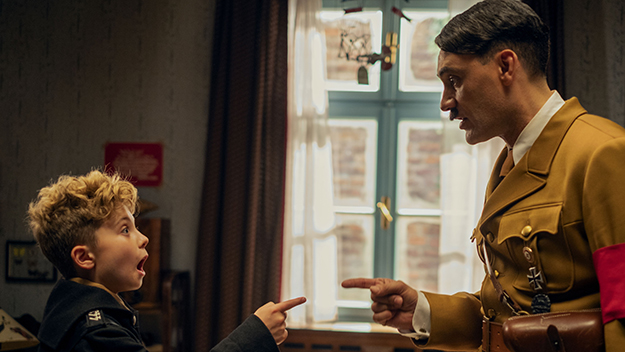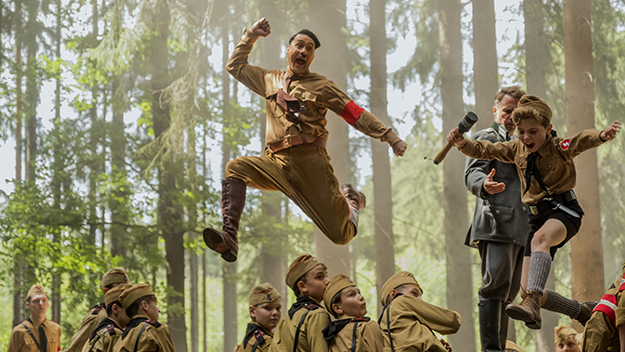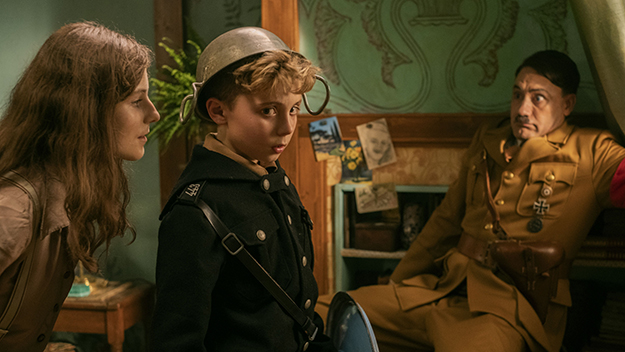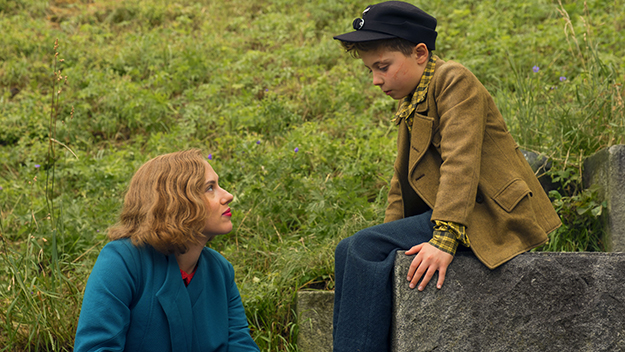Film of the Week: Jojo Rabbit

Images from Jojo Rabbit (Taika Waititi, 2019)
As you might guess from the title, Jojo Rabbit is a terribly cute movie. It just happens to be a terribly cute movie about Nazism. It’s written and directed by Taika Waititi, who has established himself as cinema’s current specialist in the dopey. By dopey, I mean something considerably smarter than dumb, more knowing than goofy, hipper than nerdy: his characteristic tone is a sweet-natured but knowing faux-gaucheness, as epitomized here by the exuberant, anachronistic use of the Beatles’ German-language version of “I Want to Hold Your Hand.”
Whether or not such polished flipness is the right tone to apply to a comedy about an earnest if inept Hitler Youth member toward the end of World War Two, Waititi has nevertheless taken on the challenge, and you can’t fault him on chutzpah. The film is outright farce, although it’s based on Caging Skies, a novel by Christine Leunens, which apparently treats its subject very seriously. I laughed a couple of times—somewhat despite myself, which is probably the way the film wants to affect you—but overall, I can’t say that I entered into the spirit of the thing with much enthusiasm. In any case, stories about committed young Nazis may well make you feel altogether wary about the very idea of enthusiasm.
From his early New Zealand films such as Eagle vs Shark (2007), through his inspired comedy about inept vampires What We Do in the Shadows (2014), even in Thor: Ragnarok (2017), where he voiced a dorky talking rock pile, Waititi has been interested in likeable, sheepish misfits, and the hero of Jojo Rabbit is absolutely cut from this cloth. Here the cloth comes in brown, the color of the Hitler-Jugend uniform he wears so proudly. He is 10-year-old Johannes (“Jojo” for short) Betzler, played by the adept, hugely likeable Roman Griffin Davis. Jojo is an awkward, nervous lad newly inducted into the movement and fired up by the tenets of Nazism, even though he can’t remotely understand what it really means. He has swallowed whole the mythology of Jews as evil, almost extraterrestrial beings—“Serpent’s tongue! Scales!”—and aspires to be a bold Aryan soldier, just as in other cultures or times he might have yearned to be an astronaut or Batman. Lonely at home—his sister has died, his father is away—he’s very close to adoring mother Rosie (Scarlett Johansson), but is young enough and scared enough of the world to have conjured up an imaginary friend to comfort him. That friend is Adolf Hitler.
In this respect, Jojo Rabbit is altogether plausible. When Berlin’s German Historical Museum mounted a groundbreaking, highly controversial exhibition in 2010 entitled Hitler and the Germans: Nation and Crime, perhaps the most startling exhibit was a collection of letters and postcards written to the Führer by children in the 1930s and ’40s: among them, at least one of them addressed “Dear Uncle Hitler.” Jojo Rabbit is accurate in its reminder that Nazism was sold to children as well as adults, but it treats the idea with comic whimsy and runs with it—indeed, merrily capers. At the start, Jojo dashes through his hometown, making his Hitler salute into one of the wings of an imaginary airplane.

Played by Waititi himself, the Hitler of Jojo Rabbit is not the stern demagogue of the Nuremberg podium—although he eventually shifts into scary, Demon King mode—but a wise-cracking, childlike surrogate brother, given to Looney Tunes capers (at one point, elegantly leaping out of an open window), flagrant anachronisms (“Correctamundo!”), and cutesy reassurances (“You’re the bestest, most loyal little Nazi I ever met!”). He’s a mix between Bugs Bunny, the toy tiger that comes alive in the Calvin and Hobbes strip, and the hippie Hitler played by Dick Shawn’s acid-addled actor Lorenzo St. DuBois in Mel Brooks’s The Producers.
Very much his own director, Waititi here nevertheless comes visually and stylistically too close to Wes Anderson to be truly distinctive. Perhaps he felt that Anderson-esque use of cartoonish characterization and symmetrical, heightened mise en scène would establish a comic distance that would make his premise acceptable. Certainly there’s a sense of déjà vu (should that be schon gesehen?), not least when Jojo attends a training camp run by world-weary Captain Klenzendorf, played by Sam Rockwell. This sequence, set in a forest, feels almost as if Waititi had taken Anderson’s Moonrise Kingdom and digitally inserted a bunch of swastikas. Klenzendorf’s right-hand woman Fräulein Rahm is played by Rebel Wilson, who fits a familiar “German lady” stereotype—large, blonde, easily imaginable in a horned helmet singing Wagner’s “Liebestod.”
Things take a darker turn when Jojo is called on at camp to show his Aryan backbone by killing a rabbit, and can’t do it. The other kids call him “Jojo Rabbit” and chant his name cruelly. Thankfully, Hitler is there to console him—“People used to say nasty things about me,” he smiles—and help him to overcome his challenges. “Be the rabbit,” he urges. “The humble bunny can outwit all his enemies.” This leads to Jojo injuring himself with dynamite, which gets him being stuck at home recuperating—where he discovers a mysterious presence in the house. It turns out that his mother has been harboring a young Jewish girl, Elsa (Thomasin McKenzie), who is hiding in the attic.
This somewhat ups the ante: let’s assume that we can laugh about Hitler, but can we accept a film effectively using Anne Frank for its comic hook? The joke here is that the brave young Nazi is terrified of the Jewish girl—as is a trembling Hitler himself when he beholds her. Elsa is indomitably unimpressed by Jojo, acting like an impatient babysitter saddled with a clueless charge, and the film soon shifts into a gentle depiction of their burgeoning fondness. At this point the provocation, such as it is, rests on Elsa amusing herself by feeding the gullible tyke more and more outrageous myths about Jews.

The friendship nevertheless gives the film some human substance, if only because McKenzie and Davis are fine actors who work up a real sibling chemistry, by turns warm and spiky. But there is only one moment at which the situation is invested with any sense of peril. When the Gestapo visit Jojo’s house, Elsa looks set to be discovered, only to save herself through daring ingenuity: the leather-coated visitors, however, are led by Stephen Merchant, inspired casting visually as a comical eccentric, but as menacing as a plate of lukewarm nudeln.
What’s worrying is that, while Jojo Rabbit mocks anti-Semitism by having its Nazis spout ludicrous sci-fi myths about Jews, it doesn’t look straight at the real-world effect of that belief. The film coyly elides any sense of what would have happened to Elsa had she been caught—clearly a decision consciously made in a film that shows Nazism through a naïve child’s eyes—but the reality of death is altogether glazed over. Early on, Jojo and his mother see a number of corpses hanging in clear sight on a gallows in a city square. “What did they do?” he asks. “What they could,” she says solemnly, introducing the theme of an underground resistance.
Rosie makes Jojo look at the bodies—at the reality of death—but in its flippancy, the film makes us avert our gaze. Death never seems to mean anything: if it does, it’s not really as death per se, more as the general disappointment that comes with growing up. The gallows episode foreshadows what might have been the film’s truest moment—one in which Jojo finally faces the realities of death, and of Nazism’s horror. But the latter scene carries no emotional impact, partly because it’s done with such concision and visual cleanness, partly because by this point, the film has lost its ability to modulate coherently between farce and emotional directness.
The film is ruinously subject to this kind of euphemization, making everything much sweeter and neater than it might or should have been. Once the war is drawing to its end and Germany falls, Waititi creates a vista of Devastation Lite. We see Jojo picking through ruins, traipsing through snow, but there’s no sense that any truly dreadful change has taken place: he’s resilient and good-humored in the face of calamity. Sure, Waititi isn’t remaking Rossellini’s Germany Year Zero, but still…
There are some grace notes to the film, and its actors take to its challenge with gusto. As Elsa, a dapper fashion plate in crisp jackets and swanky shoes, Scarlett Johansson in particular shows tender elegance as well as a farceuse’s vim, insouciantly kneeing Rockwell in the balls, then slapping him with her gloves like a Heidelberg duelist. Unfortunately Johansson also has to carry the sentimental weight of the film, as Rosie urges Elsa to stay brave (“As long as there’s someone alive somewhere, then they lose”) and giving her starry-eyed romantic advice on how to be a woman (“Go to Morocco—have lovers—make them suffer”).

There isn’t room here to rehearse the arguments about whether it’s OK to laugh about Hitler. The Producers made jaws drop with delight in 1967, much as the jaws dropped on the outraged first-night audience of Springtime for Hitler—but it’s arguable that the film’s long-term effect has been to make it harder to be outraged by Nazis. Still, Brooks was only adding a brasher twist to what Chaplin had already done in The Great Dictator and Lubitsch in To Be or Not to Be. More recently, other artists have tried to restore the confrontational, satirical edge to absurd depictions of the dictator, sometimes to ludicrous effect: Menno Meyers’s Max, about his youth as a failed artist, scored a notable own goal with the knowing line, “You’re an awfully hard man to like, Hitler.” Timur Vermes’s best-selling German novel Look Who’s Back, filmed in 2015 by David Wnendt, provocatively suggested that if Hitler returned today, he might be welcomed with open arms (something that now looks horribly plausible).
As for Jojo Rabbit, its satirical proposition is that Nazism is essentially infantile, a systemized way of acting out fantasies about idealized adulthood. When Hitler reassures Jojo at the camp, he’s fulfilling the same function as Charles Atlas once did in those comic-strip ads where he told poor put-upon Mac that he too could be a muscular he-man. Of course, Nazism wasn’t simply infantile, which is what makes the film so inadequate. But it’s the facetious coziness of the whole—the larky depiction of Nazism as an idiotic pantomime—that makes it so feeble. At the end, the Führer is dismissed, like the Wicked Witch of the West, as Jojo—and the audience, by implication—gets to say, “Fuck off Hitler!” It’s a pretty facile catharsis.
Comedies about the Third Reich only work, surely, if they elide the Holocaust, which is to deny the central fact of Nazism. Some films have attempted to use comedy as a way of reasserting human values in the face of the horror of the Shoah, and we know how those have worked out. Too few of us have seen Jerry Lewis’s The Day the Clown Cried at firsthand in any form to comment authoritatively on it, and it’s tempting to feel that that’s just as well. Then there was Roberto Benigni’s Life Is Beautiful, a work of outrageous sentimentality which basically served to tell us that only a clown with a heart as big as Benigni’s could possibly redeem the atrocities it addressed. Jojo Rabbit isn’t a monstrosity of that ilk—it’s much smarter, and considerably redeemed by its modesty. It’s good-natured and impish, but it seems to believe that fascism is a bad joke that can be overcome with good humor and a stout heart. At a time when the reality of the Holocaust is not only being rapidly forgotten but actively denied by many, the sweetness of Jojo Rabbit is not offensive, as some have found it, just a little pallid and perhaps just wrong for this moment.
Jonathan Romney is a contributing editor to Film Comment and writes its Film of the Week column. He is a member of the London Film Critics Circle.







